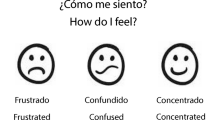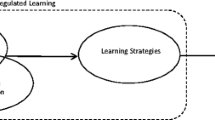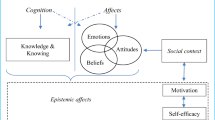Abstract
This paper presents affect as an essential aspect of students' self-reflection and self-regulation. The introduced concepts of self-system and self-system process stress the importance of self-appraisals of personal competence and agency in affective responses and self-regulation in problem solving. Students are viewed as agents who constantly interpret and evaluate their experiences and regulate their behaviour, in interaction with their mathematics learning environment. This perspective is used to interpret two data sets: Finnish secondary school students' questionnaire responses and their mathematics achievement, and Frank's problem solving episode. The former study examines statistical relations between self-confidence, positive and negative affective responses, self-regulatory patterns, and math performance. The latter focuses on Frank's appraisals and self-regulatory processes with his affective responses while problem solving. Finally, I consider the perspective's usefulness and compare it others in this Special Issue.
Similar content being viewed by others
References
Bandura, A.: 1993, ‘Perceived self-efficacy in cognitive development and functioning’, Educational Psychologist 28, 117–148.
Blasi, A.: 2004, ‘Neither personality nor cognition: An alternative approach to the nature of the self’, in C. Lightfoot, C. Lalonde, and M. Chandler (eds.), Changing Conceptions of Psychological life, Erlbaum, Mahwah, NJ, pp. 3–25.
Boekaerts, M.: 1995, ‘Affect, emotions, and learning’, in L.W. Anderson (ed.), International Encyclopedia of Teaching and Teacher Education, second edn, Pergamon Press, pp. 402–407.
Borkowski, J.B., Carr, M., Rellinger, E. and Pressley, M.: 1990, ‘Self-regulated cognition: Interdependence of metacognition, attributions and self-esteem’, in B.F. Jones and L. Idol (eds.), Dimensions of Thinking and Cognitive Instruction, Erlbaum, Hillsdale, NJ, pp. 53–92.
Carver, C.S. and Scheier, M.F.: 1990, ‘Origins and functions of positive and negative affect: A control-process view’, Psychological Review 97, 19–35.
Clifford, M.M.: 1988, ‘Failure tolerance and academic risk-taking in ten- to twelve-year-old students,’ British Journal of Educational Psychology 58, 15–27.
Connell, J.P.: 1990, ‘Context, self, and action: A motivational analysis of self-system processes across the life span’, in D. Cicchetti and M. Beeghly (eds.), The Self in Transition: Infancy to Childhood, The University of Chicago Press, London, pp. 61–97.
Covington, M.V. and Roberts, B.W.: 1994, ‘Self-worth and college achievement: Motivational and personality correlates’, in P. R. Pintrich, D. R. Brown and C. E. Weinstein (eds.), Student Motivation, Cognition, and Learning, Erlbaum, Hillsdale, NJ, pp. 157–188.
Deci, E.L. and Ryan, R.M.: 1991, ‘A motivational approach to the self: Integration in personality’, in R. Dienstbier (ed.), Nebraska Symbosium on Motivation: Vol. 38. Perspectives on Motivation, University of Nebraska Press, Lincoln, pp. 237–288.
Ellsworth, P.C. and Scherer, K.R.: 2003, ‘Appraisal processes in emotion’, in R.J. Davidson, K.R. Scherer and H.H. Goldsmith (eds.), Handbook of Affective Sciences, Oxford University Press, New York, pp. 572–595.
Fennema, E. and Sherman, J.A.: 1976, ‘Fennema–Sherman mathematics attitudes scales’, JSAS Catalog of Selected Documents in Psychology 6, 31 (Ms. Mo. 1225).
Garcia, T. and Pintrich, P.R.: 1994, ‘Regulating motivation and cognition in the classroom: The role of self-schemas and self-regulatory strategies’, in D.H. Schunk and B.J. Zimmermann (eds.), Self-Regulation of Learning and Performance: Issues and Educational Applications, Erlbaum, Hillsdale, NJ, pp. 127–153.
Goldin, G.A.: 2000, ‘Affective pathways and representations in mathematical problem solving’, Mathematical Thinking and Learning 17, 209–219.
Hatfield, L.L.: 1991, ‘Enhancing school mathematics experience through constructive computing activity’, in L.P. Scheffe (ed.), Epistemological Foundations of Mathematical Experience, Springer-Verlag, NY, pp. 238–259.
Hembree, R.: 1990, ‘The nature, effects and relief of mathematics anxiety’, Journal for Research in Mathematics Education 21, 33–46.
Harter, S.: 1985, ‘Competence as a dimension of self-evaluation: Toward a comprehensive model of self-worth’, in R.L. Leahy (ed.), The Development of Self, Academic Press, Orlando, pp. 55–121.
Kuhl, J. and Kraska, K.: 1994, ‘Self-regulation in learning’, in T. Husen and T.N. Postlethwaite (eds.), The International Encyclopedia of Education, 2nd edn, Vol. 9, BPC Wheatons, Exeter, UK, pp. 5400–5403.
Lazarus, R.S.: 1991, ‘Cognition and motivation in emotion’, American Psychologist 46, 352–367.
Malmivuori, M.L.: 1996, ‘Self-confidence in students' belief structures’, International Reviews on Mathematical Education (= ZDM) 4, 121–126.
Malmivuori, M.L.: 2001, The Dynamics of Affect, Cognition, and Social Environment in the Regulation of Personal Learning Processes: The Case of Mathematics. Research Report 172, Helsinki University Press, Helsinki, Finland.
Malmivuori, M.L.: 2004, ‘A dynamic viewpoint: Affect in the functioning of self-system rpocesses’, in M.J. Høeines and A.B. Fuglestad (eds.), Proceedings of the PME-28 Conference, Vol. 1, Bergen University College, Norway, pp. 114–118.
Malmivuori, M.L. and Pehkonen, E.: 1996, ‘Mathematical beliefs behind school performances’, in L. Puig and A. Gutierrez (eds.), Proceedings of the PME-20 Conference, Vol. 3, University of Valencia, Valencia, Spain, pp. 305–311.
Mandler, G.: 1989, ‘Affect and learning: Causes and consequences of emotional interactions’, in D.B. McLeod and V.M. Adams (eds.), Affect and Mathematical Problem Solving. A New Perspective, Springer-Verlag, New York, pp. 3–19.
McCombs, B.L.: 2001, ‘Self-regulated learning and academic achievement: A phenomenological view’, in B.J. Zimmerman and D.H. Schunk (eds.), Self-Regulated Learning and Academic Achievement: Theoretical Perspectives, Erlbaum, Mahwah, NJ, pp. 67–123.
McLeod, D.B.: 1992, ‘Research on affect in mathematics education: A reconceptualization’, in D.A. Grouws (ed.), Handbook of Research on Mathematics Teaching and Learning, Macmillan, New York, pp. 575–596.
Meece, J.L., Wigfield, A. and Eccles, J.S.: 1990, ‘Predictors of math anxiety and its influence on young adolescents' course enrollment intentions and performance in mathematics’, Journal of Educational Psychology 82, 60–70.
Pekrun, R., Goetz, T., Titz, W. and Perry, R.P.: 2002, ‘Academic emotions in students' self-regulated learning and achievement: A program of qualitative and quantitative research’, Educational Psychologist 37, 91–105.
Pintrich, P.R. and DeGroot, E.V.: 1990, ‘Motivational and self-regulated learning components of classroom academic performance’, Journal of Educational Psychology 82, 33–40.
Polkinghorne, D.E.: 2001, ‘The self and humanistic psychology.’, in K.J. Schneider, J.F.T. Bugental and J.F. Pierson (eds.), The Handbook of Humanistic Psychology, Sage, Thousand Oaks, CA, pp. 81–99.
Sarason, I.G.: 1972, ‘Experimental approaches to test anxiety: Attention and the uses of information’, in C.D. Spielberger (ed.), Anxiety. Current Trends in Theory and Research, Vol. 2, Academic Press, NY, pp. 383–400.
Schoenfeld, A.H.: 1983, ‘Beyond the purely cognitive: Belief systems, social cognitions, and metacognitions as driving forces in intellectual performance’, Cognitive Science 7, 329–363.
Schutz, P.A. and DeCuir, J.T.: 2002, ‘Inquiry on emotions in education’, Educational Psychologist 37, 125–134.
Seegers, G. and Boekaerts, M.: 1996, ‘Gender-related differences in self-references cognitions in relation to mathematics’, Journal for Research in Mathematics Education 27, 187–215.
Skaalvik, E. M.: 1997, ‘Self-enhancing and self-defeating ego orientation: Relations with task and avoidance orientation, achievement, self-perceptions, and anxiety’, Journal of Educational Psychology 89, 71–81.
Taylor, G.J., Bagby, R.M. and Parker, J.D.A.: 1997, ‘The development and regulation of affects’, in G.J. Taylor, R.M. Bagby and J.D.A. Parker (eds.), Disorders of Affect Regulation, Cambridge University Press, pp. 7–25.
Turner, J. E., Husman, J. and Schallert, D. L.: 2002, ‘The importance of students' goals in their emotional experience of academic failure: Investigating the precursors and consequences of shame’, Educational Psychologist 37, 79–89.
Wigfield A. and Meece, J.L.: 1988, ‘Math anxiety in elementary and secondary school students’, Journal of Educational Psychology 80, 210–216.
Zimmerman, B.J. and Schunk, D.H. (eds.): 2001, Self-Regulated Learning and Academic Achievement: Theoretical Perspectives, Erlbaum, Mahwah, NJ.
Author information
Authors and Affiliations
Corresponding author
Rights and permissions
About this article
Cite this article
Malmivuori, ML. Affect and Self-Regulation. Educ Stud Math 63, 149–164 (2006). https://doi.org/10.1007/s10649-006-9022-8
Published:
Issue Date:
DOI: https://doi.org/10.1007/s10649-006-9022-8




